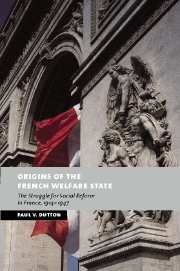Book contents
- Frontmatter
- Contents
- List of figures
- List of tables
- Acknowledgments
- List of abbreviations
- Introduction
- 1 An industrial model of family welfare
- 2 A mutual model for social insurance
- 3 Battle for control of social welfare: workers versus employers
- 4 Parliament acts
- 5 Challenges from city and countryside, 1930–1939
- 6 Retrenchment and reform, 1939–1947
- Conclusion
- Bibliography
- Index
1 - An industrial model of family welfare
Published online by Cambridge University Press: 13 July 2009
- Frontmatter
- Contents
- List of figures
- List of tables
- Acknowledgments
- List of abbreviations
- Introduction
- 1 An industrial model of family welfare
- 2 A mutual model for social insurance
- 3 Battle for control of social welfare: workers versus employers
- 4 Parliament acts
- 5 Challenges from city and countryside, 1930–1939
- 6 Retrenchment and reform, 1939–1947
- Conclusion
- Bibliography
- Index
Summary
Among the several factors that explain the development of family welfare in the 1920s, none is more important than the social and economic transformation brought about by the Great War. The war precipitated an unprecedented state intervention into industrial organization and labor relations that touched virtually all areas of social policy. Perhaps the most influential wartime innovation was the system of worker remuneration known as the salaire vital, which explicitly divided the wage between two basic categories: productive and social use. This chapter analyzes the salaire vital and its influence on Paris metals employers' postwar adoption of family allowances as a wage strategy. The growth in industrialists' payment of family allowances functioned in tandem with France's growing pronatalist movement, which provided both rhetorical ammunition to employers as well as a popular justification for their policies. The immediate postwar years also witnessed the diffusion of caisses de compensation (equalization funds). These funds served as clearing houses for debts and credits, and facilitated employers' collective implementation of their new wage strategy. Once the national scope of the family allowance movement became evident, employers organized a lobby, the Comité Central des Allocations Familiales (CCAF), whose association with the powerful Comité des Forges lent it immediate weight in parliamentary circles. The CCAF eventually played a critical role in guarding against state intervention as well as the geographic extension of employer family allowance caisses. The post-1918 decade marked a golden age for employers’ control of family welfare.
- Type
- Chapter
- Information
- Origins of the French Welfare StateThe Struggle for Social Reform in France, 1914–1947, pp. 14 - 37Publisher: Cambridge University PressPrint publication year: 2002

